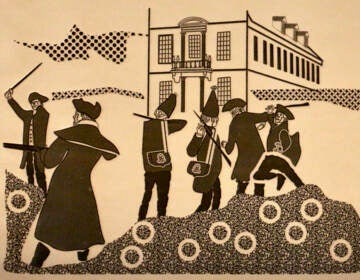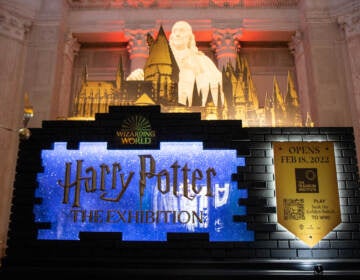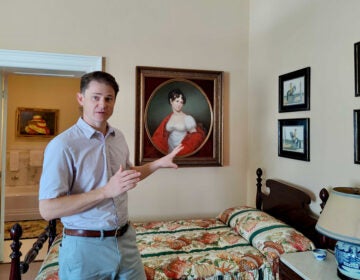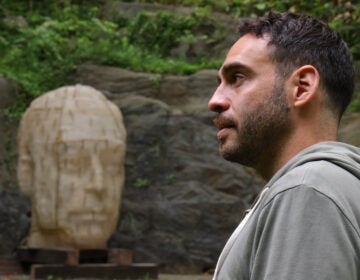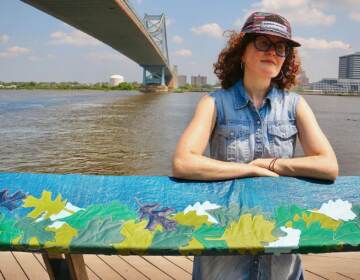Delaware River takes a bite out of a waterfront art exhibit
A show of contemporary sculpture on Cherry Street Pier hit by flooding on opening night.

Leslie Kaufman, curator or Voices and Visions, a sculpture show at Cherry Street Pier in Philadelphia, stands by a piece that was damaged in flooding the last week of October, 2021. (Kimberly Paynter/WHYY)
On the morning of Friday, Oct. 29, Philadelphia Sculptors were getting ready for the opening reception of its exhibition “Voices and Visionaries” at the Cherry Street Pier that evening, when the president of the organization, Leslie Kaufman, got a call from the Delaware River Waterfront Corporation.
It was Sarah Eberle, the creative director of the Cherry Street Pier. She said the river was rising.
“Thursday night the river had been very high and the road was flooded,” said Kaufman. “She knew it was going to get even worse on Friday night.”
It did get worse. That Friday night the Delaware River rose 10.4 feet, swamping Columbus Boulevard and flooding Cherry Street Pier with a foot of water. It was the first time the former industrial pier had flooded since it was transformed into a public attraction in 2018.
“It was an interesting learning experience for us. We were able to see how water comes onto the pier,” said Eberle. “It came from the sides, and also up through the asphalt, which is porous. In some places it bubbled up.”
Eberle said no damage was done to the pier itself, due in part to its design – the electrical and mechanical elements of the pier are installed high off ground – and due to luck.
“No debris smashed any of our windows, but could have,” said Eberle. “There are all these things that could have gone wrong, but didn’t.”
The pier’s most vulnerable elements are its artworks. The renovation in 2018 made the pier into an arts destination with several shipping containers converted into modular studios for resident artists, and regularly programmed exhibitions, performances, and craft vendors inside the partially enclosed space.
Some of the lower-level shipping-container studios were inundated with water, causing minor damage to artwork stored there. The “Voices and Visionaries” exhibition, featuring seven regional artists of color who largely self-curated themselves, emerged relatively unscathed.
Many of the sculptural works were made to withstand a certain amount of stress. Mei-ling Hom’s hand-woven baskets on caster wheels, planted with tea trees and covered with sculpted chicken wire, got rolled around by the river water, but remained upright. Taji Ra’oof Nahl created a bundle of long, tin cylinders suspended above a Persian rug, called “Turn of Events/ Warmongers.” The rug got soaked and the tin elements were dragged a few feet by the water, but nothing that could not be righted.
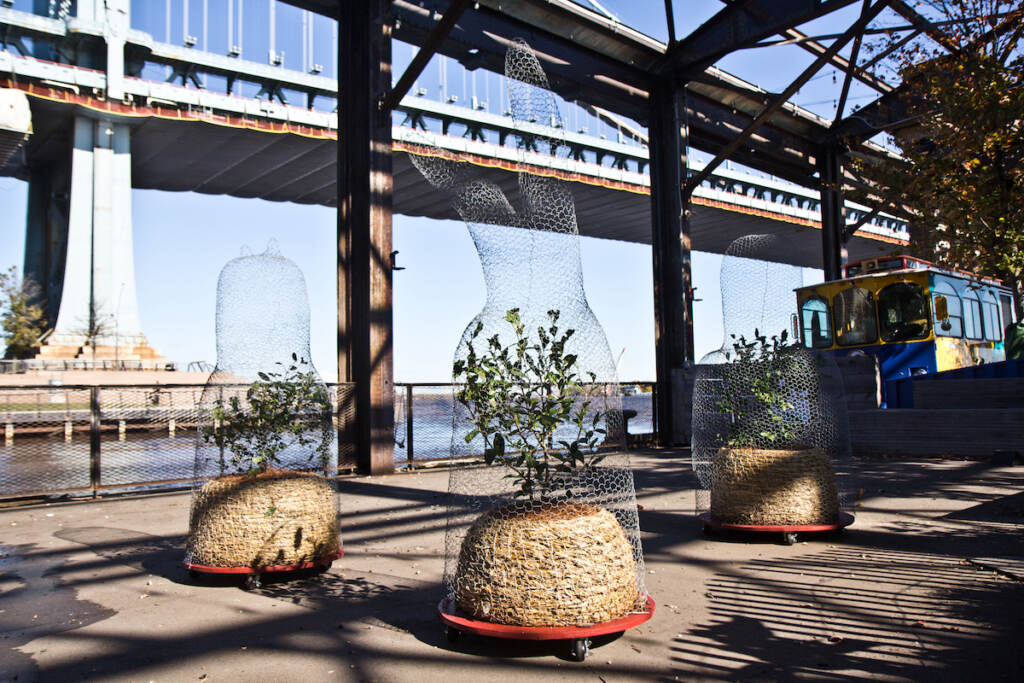
Other artists, coincidentally, referenced water and debris in their works. Lucia Garzon’s “Rise” features a twin mattress bed and cheap metal bed frame placed under a plastic canopy that leaks, referencing the conditions of immigrant laborers. Any visible watermarks are intentional, not due to the river flood.
Jermaine Ollivierre laid out car parts – tires, bumpers, headlights, etc – into the shape of a car, and covered them with old, dirty clothes, suggesting the life of someone living out of their car – a tableau of a “complicated American landscape, which depicts beautiful and deplorable moments interwoven into the fabric of society,” as the artist wrote in a statement.
When the river rose, the staff of Cherry Street Pier picked up all the clothes in Ollivierre’s sculpture and moved them to higher ground. They have been returned, and the artist plans to return to the pier to rearrange all the elements. Residual flood debris will likely fit into his original vision.
Syd Carpenter created an installation of sculptural works based on farms owned by Black farmers, bathed in the light of projected photographs. The piece was not touched by the flood, but a tell-tale water line where the river left a ring of dirt shows how close it came.
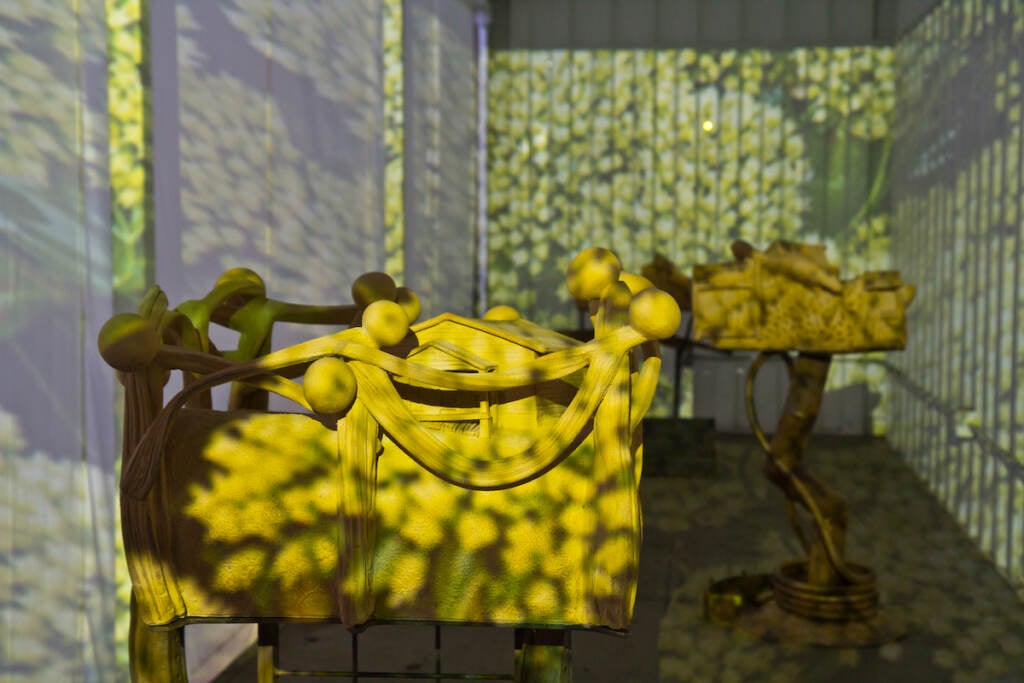
This is not the first time Philadelphia Sculptors came into conflict with the Delaware River. Two years ago the organization created “Flow,” an exhibition of sculptures made to be seen on the water, shown at the marina outside Independence Seaport Museum.
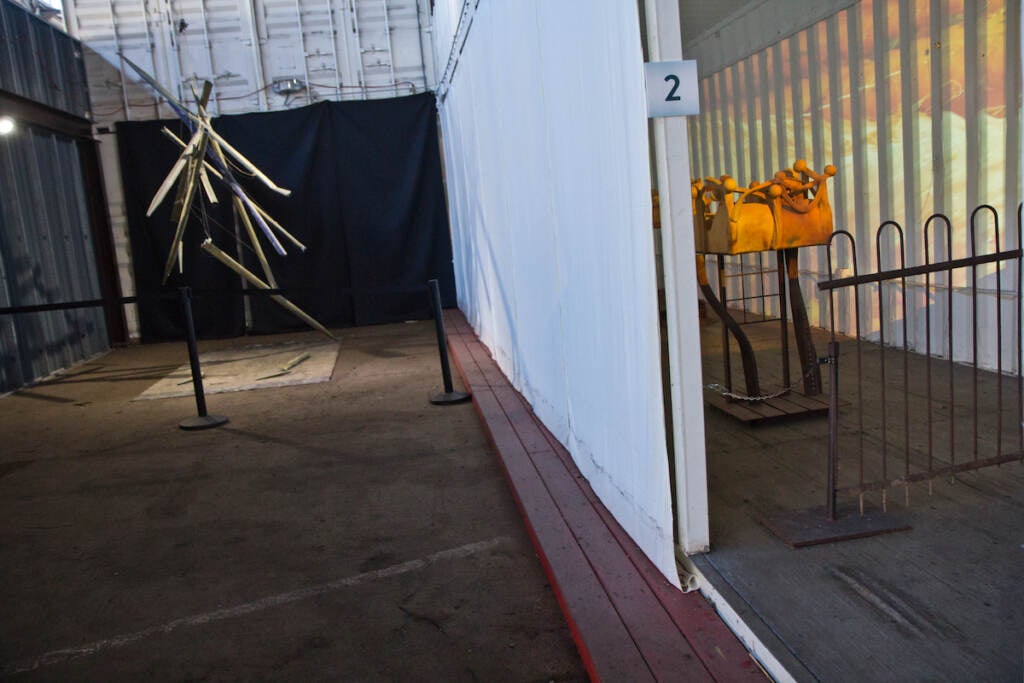
That exhibition was hammered by two powerful storms. A large-scale work by Miguel Horn, an enormous floating bust of his father – was destroyed.
It was not the wind or the rain that wreaked havoc on the artwork, but the river itself. The current, churned up by storm energy, tore apart the floating sculptures.
“Some of the artists just couldn’t possibly have anticipated the strength of the current. We just did not know,” said Kaufman. “I have developed such a great respect for the river. It seems like the river is constantly reminding me that I can’t forget that.”
Because the Cherry Street Pier is a roofed structure, Eberle had assumed art exhibitions would be reasonably safe. She is relieved the recent damage was minimal, but it put the fear into her.

“It definitely is making me more aware. I’m thinking about things differently,” she said. “From now on, I will always tell people that there is the possibility that water will come.”
The exhibition “Voices and Visionaries” is back in place and will remain until Jan. 28. The opening reception has been postponed until Nov. 20.
WHYY is your source for fact-based, in-depth journalism and information. As a nonprofit organization, we rely on financial support from readers like you. Please give today.



